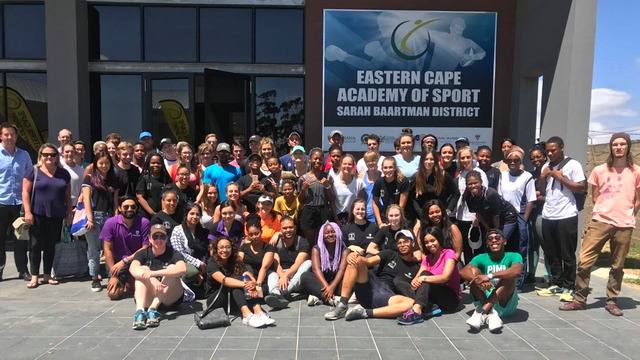
Dr Jono Davy, Mr Andrew Todd and Mr Ben Ryan of Rhodes University’s Department of Human Kinetics and Ergonomics (HKE) have been recognised as the recipients of the 2019 Vice Chancellor’s Distinguished Award for Community Engagement.
Individually and as a team, Dr Davy, Mr Todd and Mr Ryan are being acknowledged for their collaborative efforts to shift the HKE Department towards a more engaged approach to research and teaching and learning; and towards evolving a philosophy based on holism and the systems approach, underpinned by clear values and expectations to guide their department’s community engagement activities.
Consequences of their eight year evolutionary journey with community engagement include: the integration of theory with practice through service learning and engaged research, thereby moving students physically, psychologically and intellectually from the confines of a laboratory to the lived reality of communities and their work situations; the development of collaborative partnerships with relevant stakeholders; and a shift from disciplinary specificity to transdisciplinary.
Dr Jono Davy
As the coordinator of community engagement activities in the HKE Department, Dr Davy has understood the value of working with and learning from the surrounding community. He initiated a number of community-based projects, such as the Joza Physical Education programme at Nombulelo, Khutliso Daniels and Ntsika schools. The project provided each interested learner with the opportunity to learn about their health, fitness and how to train for improvement in these areas. Two years in, the project was integrated in the Grade 12 Life Orientation curriculum, which gave it more focus and opened up the opportunities to also build the capacity of the teachers in this area.
In 2017, Dr Davy in a partnership with Mr Todd, conceptualised, developed and team-taught the first integrated Honours module in the Department’s history, entitled ‘Systems and Advanced Biomechanics and Chronobiology’. One of the goals of this module was to push students to understand the broader systems context that both of these sub-disciplines form part of and to apply the systems approach within a real-world context. This course led to the Department’s first attempt at service learning as a method of teaching the systems approach. It was anticipated that students’ time in the work system would afford them insights into the work processes, the workers themselves, the tasks and the activities required, the environmental and organisational factors and the inputs and outputs of the work environment. A collaborative partnership with the Centre for Biological Control (CBC) Waainek Facility in the Department of Zoology and Entomology at Rhodes University was established for this purpose.
The results from students’ evaluation and feedback in 2017 and 2018 have led to ongoing improvement of the service-learning programme. In 2019, the partnership with the CBC Waainek Facility took on a research focus. Dr Davy’s work has shown the positive outcome of collaborative relationships and working across disciplines.
Mr Andrew Todd
Andrew Todd’s work in the HKE Department highlights the move from a traditional (laboratory) approach to research, to research that requires working with and understanding the local context and community (engaged research). The transformation in the team’s thinking was a consequence of questioning the changing landscape of South African universities; questioning the prevailing philosophy of research and learnings from their international travel, especially to Latin America as part of the executive committee of International Ergonomics Association (IEA).
A profound impact was made on the team in Uruguay, where academic institutions have satellites within the poorest communities, which are responsible for co-constructing research focus areas based on the problems identified within these communities and problem solving with the communities. This approach clearly revealed to Mr Todd and his colleagues the significant contrast to the manner in which they had identified research problems. A key realisation for the team was the need to “look outside the ivory tower” and to acknowledge the agency of communities.
In order to contribute in a meaningful way, they have shifted their research out of the laboratory and into the local community to build relationships focused on co-constructing research needs and solutions to identified problems.
Mr Ben Ryan
Ben Ryan learnt about the power of engaged/participatory research when his postgraduate research, while successful from the hypothesis testing perspective, failed from the intervention angle. His research was conducted ‘on’ the football club and not ‘with’ them and the realities of the context was not taken into consideration.
Another youth development football project involving young players from Joza who were brought to use the resources of the Department and University was approached from the perspective of developing trusting and meaningful relationships between the youth, academics and student volunteers. This project served to combat the idea that Rhodes University was a foreign place where the youth of Joza were not welcome.
The efficiency of the programme was improved with the co-construction of sessions, making the process highly transformative, providing a platform for professional conduct, application, problem solving, and engagement. The development of players was followed over a two year period with baseline testing and the community engaged football programme was consolidated as a mainstay in the Department. This programme was more than football development. It was about designing interactions, allowing people to learn about each other and empathising with the South African context. Several research projects were also conducted to enhance the effectiveness of the programme.
This programme was expanded to cater for all clubs in Makana and in 2019, returned to the JD Stadium where it has diversified to include netball and indigenous games. It has exposed student volunteers to context-specific activities. The programme is embedded within the community, breaking down preconceived barriers and benefitting students and communities simultaneously.
The Award to Dr Davy, Mr Todd and Mr Ryan of the Department of HKE will be made at the 2020 Graduation Ceremony, and the team will be invited to give a public lecture on their collaborative community engaged initiatives to kick off Community Engagement Week 2020.

